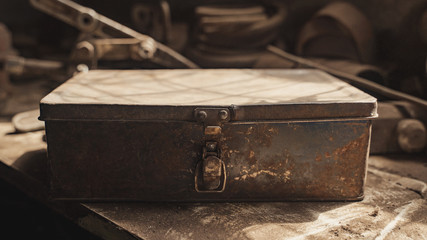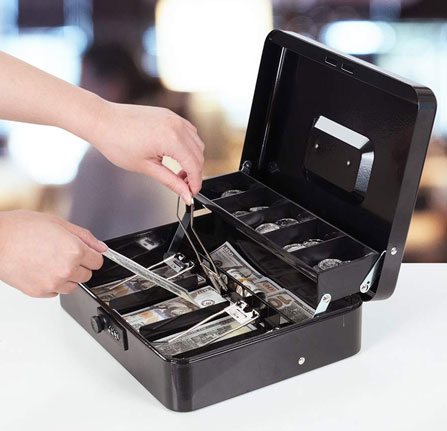Metal cash box – why buy it and how to use it?
It is quite difficult to say exactly when the first cash boxes appeared. However, the need for safe storage of valuables, including money, arose a long time ago. It can be assumed that the first "cash boxes" were simple wooden or metal chests and caskets that were locked with a lock. The more recognizable metal boxes with compartments for bills and coins that we imagine today began to appear with the development of trade and banking. Around the 18th-19th centuries, with the growth of cash turnover, there was a need for a more organized and relatively safe way to store them at points of sale and in offices. It was then that the first prototypes of modern cash boxes began to appear, often made of iron and equipped with simple mechanical locks.
The more recognizable metal boxes with compartments for bills and coins that we imagine today began to appear with the development of trade and banking. Around the 18th-19th centuries, with the growth of cash turnover, there was a need for a more organized and relatively safe way to store them at points of sale and in offices. It was then that the first prototypes of modern cash boxes began to appear, often made of iron and equipped with simple mechanical locks.How were they used before?
Previously, cash boxes were one of the main means for storing daily proceeds in stores, markets and other retail outlets. They provided basic protection against theft and allowed for the organization of cash. In offices, small cash boxes could be used to store small amounts for unexpected expenses or for the temporary storage of important documents.
The simple mechanical locks that early cash boxes were equipped with, of course, could not compare in reliability with modern safes, but they fulfilled their function - they made it difficult for outsiders to quickly access the contents.
How are they used now?
 Today, cash boxes are still widely used, although their role has changed somewhat due to the development of electronic payments. Here are the main areas of their application:
Today, cash boxes are still widely used, although their role has changed somewhat due to the development of electronic payments. Here are the main areas of their application:Retail and services: Despite the popularity of cashless payments, cash is still in circulation. Cash boxes are used to store proceeds during the working day, change coins and bills.
Modern cash registers often have built-in or plug-in cash boxes with electromagnetic locks that open on command from the cashier.
Small businesses and organizations: For storing small amounts of cash for business needs, issuing salaries (in some cases) or temporarily storing documents.
Home use: Some people use small cash boxes to store personal savings, securities or important documents at home.
Cash transportation: Compact cash boxes with a handle are convenient for transporting small amounts of cash, for example, during collection or mobile trading.
Charity collections and events: For temporary collection of donations at various events.
What are the advantages of using them?
Organization: Cash boxes with compartments for bills and coins help maintain order and quickly find the required amount.
Security (basic): Provide a certain level of protection against accidental access or petty theft. The presence of a lock is already an obstacle.
Accounting: Helps control the movement of cash during the day.
Ease of transportation: Compact models with a handle are easy to carry.
Availability: Cash boxes are relatively inexpensive and available in various sizes and configurations.
Is it a reliable way to store and transport cash and documents or not?
The answer to this question is no, not always. The reliability of a cash box depends on several factors:
Quality of manufacture and metal thickness: Simple metal cash boxes with a thin body and a simple mechanical lock are not a serious obstacle to burglary.
Lock type: More modern models can be equipped with combination or electronic locks, which provide a higher level of security.
Storage / transportation location: Even the most reliable cash box will not protect against theft if it is left unattended in an easily accessible place.
For serious storage of significant amounts of cash and important documents, it is better to use safes, which have a much higher level of protection against burglary, fire and other threats. Safes are made of thicker steel, have multi-stage locking systems and can be attached to the floor or wall.
For transporting large amounts of cash, there are special armored cases and cash collection services.
Is there an alternative?
Yes, there are several alternatives to cash boxes, depending on the purpose of use:
Safes: For stationary storage of large amounts and valuable documents.
Cash registers with a protected cash drawer: In retail.
Bank safes: For storing valuables outside the home or office.
Electronic wallets and cashless payments: To minimize the turnover of cash.
Bags and cases with combination locks: For transporting small amounts with additional protection.
In conclusion, it can be said that cash boxes have been and remain a useful tool for organizing and providing basic protection for cash and small valuables. However, to ensure a high degree of reliability when storing and transporting significant amounts and important documents, more serious solutions should be considered, such as safes and professional cash collection services.

